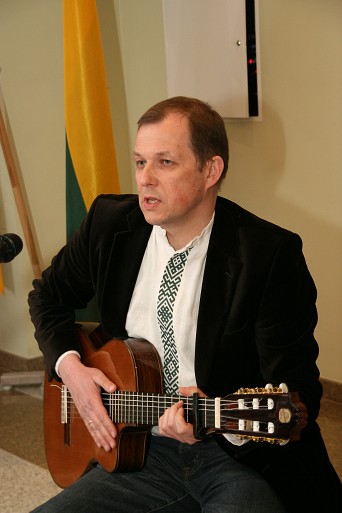THE SINGING ONES
I
Lithuania’s path to independence in the public space of the Soviet Socialist Republic of Lithuania began with a few seemingly non-political and non-ideological phenomena – basketball and sung poetry. Basketball united everyone wishing to defeat Moscow: the court offered stage for both refining the national team play and for rehearsing March 11. Meanwhile the metaphorical songs of Vytautas Kernagis were too hard to crack for the Soviet censors. Such poetry promoted intellectual, civic forms of resistance, cheered the lovers of Aesopian language and gave the feeling of freedom. Most of the readers of that time had no problem understanding what kind of Lithuania was described in the poem written by Marcelijus Martinaitis during the Soviet occupation:
Kukutis is riding and speaking:
“Lithuania looks so much like Lithuania!
The birches! The birches look just like birches!
And the sky! It’s always so Lithuanian,
Just like the sky
above Lithuania!
Where does all this likeness
to Lithuania come from –
whatever one remembers,
all resembles Lithuania.”
Looking for that resemblance,
Kukutis strains grain through his fingers,
crumbles a lump of earth
and looks at a split stone:
“Where does this likeness
of the entire Lithuania to Lithuania
come from?”
No one can destroy this likeness:
Whatever the magic,
the sky remains
like Lithuania;
wherever one goes,
whatever one thinks,
all shall resemble Lithuania:
the sky,
the grain
falling through the fingers,
the beetroot fields
flowering with women.
II
In the 20th year of the independence, there is a weird feeling that sung poetry and basketball are still at the same barricades of the ideological front with the biased, rigid Lithuania on the other side, still fighting for the free, beautiful and united Lithuania – for the country resisting the occupation of vulgarity, lechery and rudeness that are devouring the powdered parodies of TV song and dance shows.
What is culture and what kind of culture is supported in Lithuania these days? When Vilnius was the European capital of culture, it was Björk, expensive fireworks and the Pipe… There is the standard culture with its national theatres, events and song festivals. There are the costly jazz festivals favoured and funded by ministers. And there are bards who are being marginalised, but still 10 000 people show up to listen to their songs – drawn by the same reasons as during the fight for independence. This is another, different Lithuania, rarely seen and heard on television and in newspapers – free, respectful, playful and honest. It does not marginalise anyone and does not humiliate itself.
Perhaps it is for the best that the singing and song-writing does not receive the support of the Ministry of Culture, or else it might get corrupted too. Just like during the Soviet era, it is all by itself. Perhaps the culture of minstrels is destined to survive beggar style. It is said that in medieval Lithuania, when sacred oak forests and other sanctuaries were destroyed, the priests became beggars and bards.
(…)






